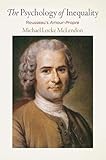The Psychology of Inequality : Rousseau's "Amour-Propre" / Michael Locke McLendon.
Material type: TextSeries: Haney Foundation SeriesPublisher: Philadelphia : University of Pennsylvania Press, [2018]Copyright date: ©2019Description: 1 online resource (224 p.)Content type:
TextSeries: Haney Foundation SeriesPublisher: Philadelphia : University of Pennsylvania Press, [2018]Copyright date: ©2019Description: 1 online resource (224 p.)Content type: - 9780812295733
- 320.01/9 23
- JC179 .M42 2018
- online - DeGruyter
| Item type | Current library | Call number | URL | Status | Notes | Barcode | |
|---|---|---|---|---|---|---|---|
 eBook
eBook
|
Biblioteca "Angelicum" Pont. Univ. S.Tommaso d'Aquino Nuvola online | online - DeGruyter (Browse shelf(Opens below)) | Online access | Not for loan (Accesso limitato) | Accesso per gli utenti autorizzati / Access for authorized users | (dgr)9780812295733 |
Frontmatter -- Contents -- Introduction -- Chapter 1. Being Aristos and the Politics of Aristocracy -- Chapter 2. Amor Sui and Amour- Propre in Augustine and Neo- Augustinianism: Surrogate Virtue or Gateway to Libido Dominandi? -- Chapter 3. Amour- Propre in Rousseau: Subverting the Aristocratic Personality -- Chapter 4. Tocqueville’s Liberal Reply -- Conclusion -- Notes -- Bibliography -- Index -- Acknowledgments
restricted access online access with authorization star
http://purl.org/coar/access_right/c_16ec
In The Psychology of Inequality, Michael Locke McLendon looks to Jean-Jacques Rousseau's thought for insight into the personal and social pathologies that plague commercial and democratic societies. He emphasizes the way Rousseau appropriated and modified the notion of self-love, or amour-propre, found in Augustine and various early modern thinkers. McLendon traces the concept in Rousseau's work and reveals it to be a form of selfish vanity that mimics aspects of Homeric honor culture and, in the modern world, shapes the outlook of the wealthy and powerful as well as the underlying assumptions of meritocratic ideals.According to McLendon, Rousseau's elucidation of amour-propre describes a desire for glory and preeminence that can be dangerously antisocial, as those who believe themselves superior derive pleasure from dominating and even harming those they consider beneath them. Drawing on Rousseau's insights, McLendon asserts that certain forms of inequality, especially those associated with classical aristocracy and modern-day meritocracy, can corrupt the mindsets and personalities of people in socially disruptive ways.The Psychology of Inequality shows how amour-propre can be transformed into the demand for praise, whether or not one displays praiseworthy qualities, and demonstrates the ways in which this pathology continues to play a leading role in the psychology and politics of modern liberal democracies.
Mode of access: Internet via World Wide Web.
In English.
Description based on online resource; title from PDF title page (publisher's Web site, viewed 26. Mai 2021)


